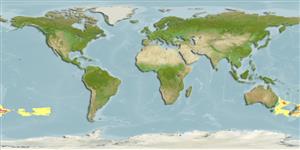klasifikasi / Names
Nama-nama umum | Sinonim (persamaan) | Catalog of Fishes(Marga, Jenis) | ITIS | CoL | WoRMS | Cloffa
>
Scombriformes (Mackerels) >
Chiasmodontidae (Snaketooth fishes)
Etymology: Pseudoscopelus: Greek, pseudes = false + Greek, skopelos = a lantern fish (Ref. 45335). Lütken did not recognize the presence of photophores on the body, confusing them with pores, but referred to a genus of lanternfish (Scopelus now Myctophum) when he named the genus (Ref. 85782); paxtoni: Named for John Paxton, in recognition of his contributions to the knowledge of the deep-sea ichthyofauna, and all the support given to the development of this work..
Issue
This species is synonym ofPseudoscopelus altipinnis Parr, 1933 in Eschmeyer (CofF ver. Jan. 2012: Ref. 89336) following (Prokofiev, 2011). Waiting for the publication.
Environment: milieu / climate zone / depth range / distribution range
Ekologi
laut batipelagis; kisaran kedalaman 893 - 1223 m (Ref. 85782). Deep-water
Southwest Pacific: Chatham Islands to west of New Zealand; from 173° W to 167° E, 39° to 48° S.
Size / Weight / umur
Maturity: Lm ? range ? - ? cm
Max length : 22.8 cm SL jantan/; (Ref. 85782)
deskripsi pendek
Kunci identifiaksi (pengenalan) | Morfologi | Morfometrik
Duri punggung (Keseluruhan (total)) : 22 - 24; Sirip dubur lunak: 21 - 23; vertebrata, bertulang belakang: 36 - 38. This species of the Pseudoscopelus altipinnis species group is distinct from P. altipinnis by dentition and photophore pattern: innermost teeth of mesial rows of premaxilla and dentary elongate, when mouth is closed and premaxilla is retracted reach the medial border of the contralateral premaxilla (vs. not extremely elongated and premaxilla is retracted teeth do not reach the medial border of premaxilla of the other side); teeth of mesial row of premaxilla and internal most row of dentary straight (vs. teeth of mesial row of premaxilla and internal-most row of dentary slightly curved); mesial series of premaxillary teeth arranged in transverse rows of one to three rows of teeth (vs. mesial series of premaxillary teeth arranged in transverse rows of one to five rows of teeth) (Ref. 85782).
Meso- to bathypelagic, from 893 to 1223 m (mean 1027 m) (Ref. 85782).
Life cycle and mating behavior
Maturities | Reproduksi, perkembang biakan | Spawnings | Egg(s) | Fecundities | Larva
Melo, M.R.S., 2010. A revision of the genus Pseudoscopelus Lütken (Chiasmodontidae: Acanthomorphata) with descriptions of three new species. Zootaxa 2710:1-78. (Ref. 85782)
Status IUCN Red List (Ref. 130435)
ancaman kepada manusia
Harmless
penggunaan manusia
Alat, peralatan
laporan khas
muat turun XML
Sumber internet
Estimates based on models
Preferred temperature (Ref.
123201): 3.9 - 5.4, mean 4.1 °C (based on 6 cells).
Phylogenetic diversity index (Ref.
82804): PD
50 = 0.5000 [Uniqueness, from 0.5 = low to 2.0 = high].
Bayesian length-weight: a=0.00389 (0.00180 - 0.00842), b=3.12 (2.94 - 3.30), in cm total length, based on all LWR estimates for this body shape (Ref.
93245).
Trophic level (Ref.
69278): 3.8 ±0.2 se; based on size and trophs of closest relatives
Fishing Vulnerability (Ref.
59153): Low vulnerability (18 of 100).
